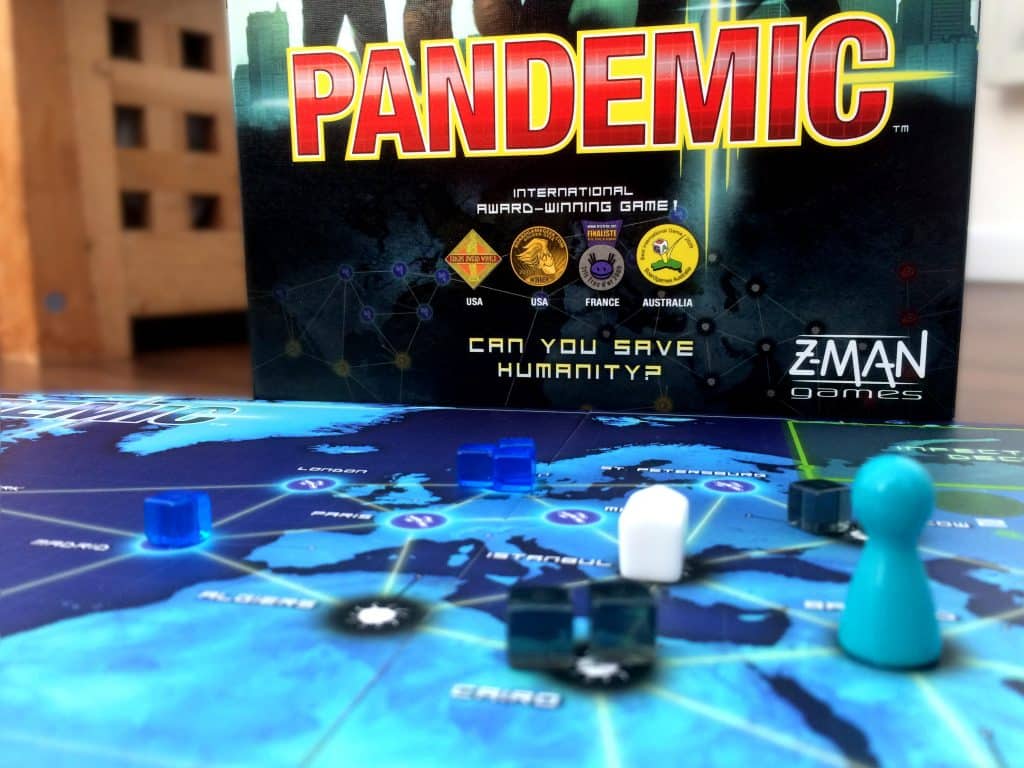I always used to be very much a competitive player. Pitting my wit against other people was my thing. I would usually lose games and still do, but it was always a lot of fun. Cooperative games really only came into my life when our daughter was young enough to play games with us that weren’t just roll-and-move. I remember our first game of Forbidden Island, which we all really enjoyed and played many times since. So in this article, I want to explore why cooperative games have become so popular in recent years.
From Competition to Collaboration
Cooperative games are clearly quite different to competitive ones. The gaming experience is quite different between them. Instead of pitting players against each other in some form of a race for victory, cooperative games allow players to team up and try to achieve a shared objective. Rather than fighting each other, people play against the game itself. Everyone has to work together and collaboratively to achieve success.
There are many types of cooperative games available now. Many of you will be familiar with escape-room-style games, where you try to solve a series of puzzles. In a similar vein are murder mystery games. The game that, in my mind, has really cemented the concept of cooperative games in our hobby is Pandemic, where everyone tries to battle a global virus outbreak while also working on finding a cure. Most recently, I’ve played Castle Panic, where you battle against a seemingly never-ending horde of orcs, goblins and other creatures.
So there is a lot of choice, but whatever it is that you like, cooperative games shift the dynamics from competition to collaboration. Cooperative games create a sense of unity and camaraderie. You have to strategize together and pool the group’s skills and abilities.
Fostering Connection and Social Bonds
The emphasis in cooperative games on teamwork promotes a cooperative spirit, encouraging players to support and uplift each other, fostering a positive and inclusive gaming experience. If done well, cooperative games have the ability to foster meaningful connections and strengthen social bonds among players. Unlike competitive games, where winning is all that matters and sometimes people end up being lost in their own thoughts, cooperative games prioritize communication, cooperation and shared decision-making.
A great cooperative game encourages players to actively listen to one another and collaborate on finding solutions. Cooperative games work in similar ways to party games. They allow everyone around the table to get a better understanding of each other’s strengths, weaknesses and general character. As a group, you will become closer. The shared victories and defeats experienced throughout the game build a sense of shared history and camaraderie.
Cooperative games can also promote inclusivity and accessibility. The collaborative nature of these games encourages everyone to actively participate, regardless of their skill level or gaming experience. Everyone contributes their strengths and as a team, everyone can help each other. Cooperative games can also nurture a sense of agency and empowerment. Each player has a vital role to play in the team’s success. Their contributions are valued and recognized, which fosters a sense of ownership and agency. It empowers players to take an active role and shape the game’s outcome. So while you’re working as a team, everyone also can get a sense of personal achievement.

From Collaboration to Quarterbacking
At the same time, there is always the risk of one player taking over a cooperative game. It’s in the nature of these games to give everyone a voice, but at the same time, it’s also very easy for one person to overrule everyone else. When one player is more knowledgeable or their specific skillset is particularly useful in the game, they might feel and quite rightly so, that they know best. The rest of the group may willingly defer most of the decision making to them. At this point, the cooperative game becomes a solo game.
Some cooperative games try to prevent this by limiting the publicly available information, limiting the types and amount of communication possible, overloading players with information or a large decision space so that they have no choice but to focus on their turn only or by some other means. If done well, these cooperative games can still work really well, but they often start to stray away from a collaborative experience into the realms of a multi-player solitaire game with a common goal.
Therefore I think it’s up to the group of players to choose the game that’s right for them and their character mix. Additionally, alpha players, who like to take over a game, should learn to hold back and give everyone a voice and allow them to make their own decisions. There are also games that are semi-cooperative, which can be a better fit for some groups. Ultimately though, some groups just don’t suit cooperative games and that is absolutely fine. Not every game is for everyone.
Embracing the Cooperative Gaming Experience
However, I have really started to love cooperative games. I know that some of my friends don’t like these types of games and that is fine. At the same time, cooperative games played with the right group create an amazing experience. By shifting the focus from competition to collaboration, these games create a unique space for fostering connection and promoting inclusivity. Whether you’re embarking on an epic quest, solving a challenging puzzle or saving the world together, cooperative board games offer an immersive and rewarding experience that transcends individual victories.
What About You?
So what about you? Have you ever played a cooperative game before? How was it? Do you like them? If you’ve never played a cooperative game before, would you be willing to try one? If not, what’s stopping you? As always, please share your thoughts and experiences in the comments below. It would be great to hear what you have to say about this genre of games.
For behind-the-scenes updates, branded merchandise, and more, please support the blog.
Useful Links
- Forbidden Island review: https://tabletopgamesblog.
com/ 2020/ 05/ 02/ forbidden-island-saturday-review/ - Pandemic review: https://tabletopgamesblog.
com/ 2020/ 01/ 18/ pandemic-saturday-review/ - Castle Panic review: https://tabletopgamesblog.
com/ 2023/ 05/ 06/ castle-panic-saturday-review/
4 Comments
What are you thoughts?
Add your thoughts on the topic to the form below and join the conversation.
Audio Version
Intro Music: Bomber (Sting) by Riot (https://www.
Main Music:
Out of the Skies, Under the Earth by Chris Zabriskie is licensed under a Creative Commons Attribution 4.0 license. https://creativecommons.
Source: http://chriszabriskie.
Artist: http://chriszabriskie.







I am also a convert to Co-Op games finding that with Children they can engage with games of complexity beyond what would work in a competitive game. But even with Adults they have become my preferred experience especially if there is a good story or sense of exploration.
Hello Edward. Thank you so much for your comment. I’m glad that you’ve found your way into cooperative games. It’s a very different experience to competitive games and fun for young and old alike.
I have found the quarterbacking and micromanagement aspects of co-op games too prevalent to enjoy many of them. When failure is collective, the person who is quickest to grasp strategy is encouraged to take over other people’s turns and quickly blast out “On your turn, do X. Then the next player does Y.”
Maintaining turn order also becomes an issue. With no need to keep people honest the rules for the intended experience start to slip. Reminding people in Star Trek panic repeatedly that we need to interrupt their plans with an enemy action for instance.
I also find that a number of co-op games haven’t really considered their resource structure. I’ve played Star Trek Panic several times and wondered why cards were dealt to each player. Marvel Legendary has good points but a lot turns into waiting and doing nothing as one person thinks through their turn. Or arguing about who really needs a functional card that would help anyone.
I carry a few co-op games in my travel bag but my experience has been that it’s a “when” the micromanager starts trying to run everyone’s turn and not an “if” because the game itself is telling them to. So there’s many more that I do enjoy but just won’t bring out again.
Hello Preston. Thank you so much for your comment. It’s really interesting to hear about your experiences with cooperative games.